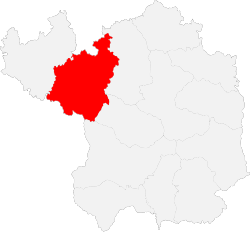|
Zhidan County
Zhidan (simplified Chinese: 志丹县; traditional Chinese: 志丹縣; pinyin: Zhìdān Xiàn) is a county under the administration of the prefecture-level city of Yan'an, in the northwest of Shaanxi Province, China, bordering Gansu Province to the south. The county has an area of 3,790.2 square kilometres (1,463.4 sq mi), and a population of 141,600 as of 2012.[1] Zhidan County and surrounding areas host oil drilling and industry. Administrative divisionsZhidan County is divided into 1 subdistrict and 7 towns.[1][2] Bao'an SubdistrictThe county's sole subdistrict is Bao'an Subdistrict, which hosts the county's government.[1][2] TownsZhidan County is home to the following 7 towns:[1][2] GeographyZhidan County is located in the hilly Loess Plateau, and is approximately 90 kilometres (56 mi) northwest of Yan'an city proper.[1] ClimateThe county's average annual temperature is 7.8 °C (46.0 °F), and its average annual precipitation is 524.5 millimetres (20.65 in).[1]
HistoryThe area now known as Zhidan County was formerly known as the town of Bao'an (Chinese: 保安; pinyin: Bǎo'ān; Wade–Giles: Pao An, Postal Romanization: Paoan) (corresponding to the urban core of today's Zhidan County). The town of Bao'an appears in many contemporaneous works and articles discussing the Chinese Civil War. The historical significance of the town of Bao'an arises due to its having temporarily served as the capital of the Communist-held regions of China in the midst of the Chinese Civil War. From early July 1936 to January 1937 Bao'an was the site of the Communist Party of China's (CPC) Central Committee headquarters, as well as that of the Chinese Communist military forces. Journalist Edgar Snow visited the communist leaders in Bao'an in the summer and fall of 1936, and named the third part of his book Red Star Over China after this town.[5] He described the town as follows:
In 1937, Yan'an (Wade-Giles: Yenan) replaced Bao'an as the capital of Communist-held China. The modern name of the county, Zhidan, takes its name from Liu Zhidan, military strategist and high-ranking leader of the Chinese Workers' and Peasants' Red Army who died while leading the Eastern Expedition in April 1936. EconomyZhidan County has a number of mineral deposits, such as petroleum, coal, natural gas, dolomite, oil shale, and mineral water.[1] References
External links |
||||||||||||||||||||||||||||||||||||||||||||||||||||||||||||||||||||||||||||||||||||||||||||||||||||||||||||||||||||||||||||||||||||||||||||||||||||||||||||||||||||||||||||||||||||||||||||||||||||||||||||||||||||||||||||||
Portal di Ensiklopedia Dunia

